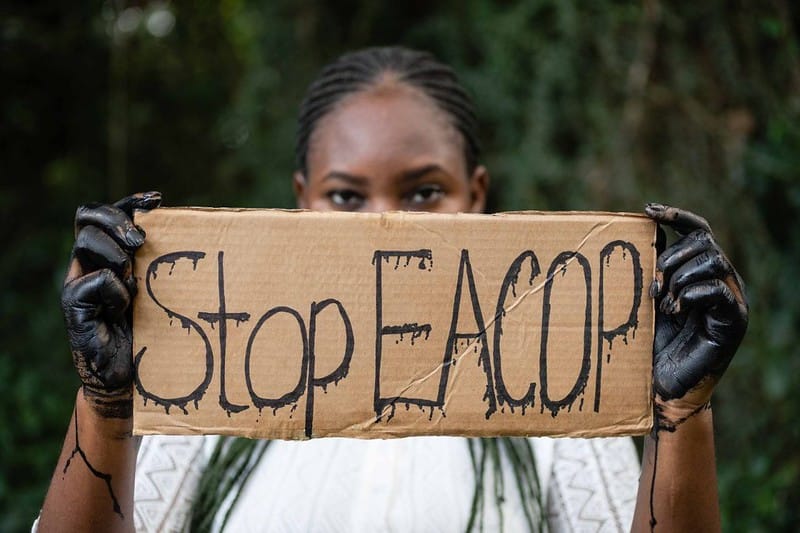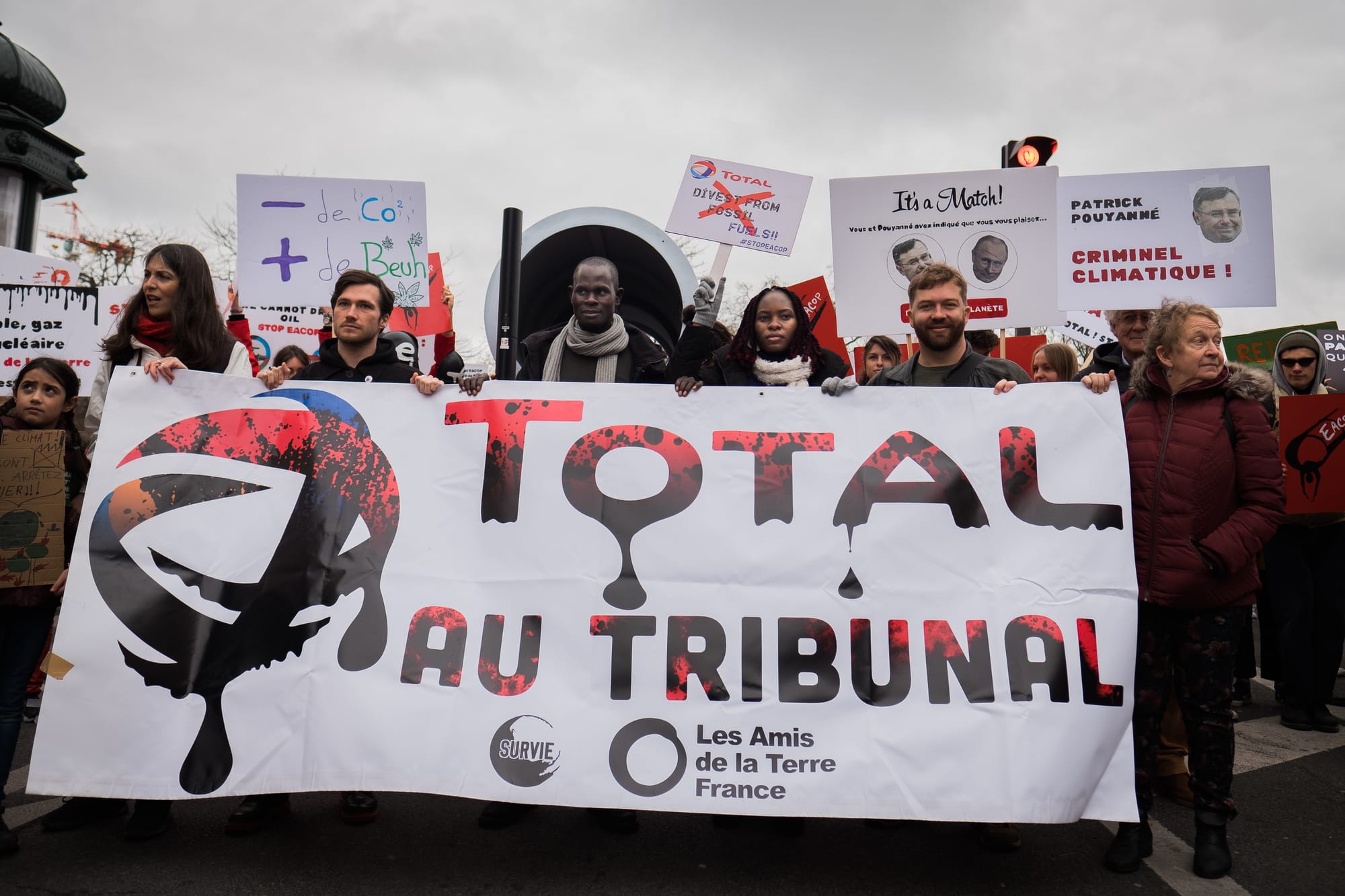The last-ditch legal attempt to stop EACOP

Ugandan and Tanzanian campaigners are preparing to go to court next week in a last-ditch attempt to block a massive polluting oil pipeline running through their countries, while activists face jail for protesting against the project.
The East African Crude Oil Pipeline (EACOP) has been in development for years as a partnership between France’s TotalEnergies, Chinese state-owned China National Offshore Oil Corporation and Uganda and Tanzania’s state oil companies.
It would connect the Albertine oil fields in Uganda to Tanga port in Tanzania but has attracted huge controversy and criticism. If completed, it will emit a vast amount of carbon emissions and have a huge impact on the lives of people along its path.
Now the East African Court of Justice, which sits in the Tanzanian city of Arusha, is to hear arguments that could make or break the project. On 15 November, campaigners will once again argue that EACOP violates laws on human rights, environment and conservation.
'Irreparable and irreversible damage'
The case was first filed in 2020 by four NGOs based in Uganda, Tanzania and Kenya: the African Centre for Energy Governance (AFIEGO), the Center for Food and Adequate Living Rights, Natural Justice and the Centre for Strategic Litigation.
They argue that Uganda and Tanzania signed an agreement on the pipeline without due regard to key East African and international laws and treaties, including the Treaty for the Establishment of the East African Community (EAC), the Protocol for Sustainable Development of the Lake Victoria Basin, the Convention on Biological Diversity and the UN Framework Convention on Climate Change. They also cite the African Charter on Human and Peoples' Rights and the African Convention on the Conservation of Nature and Natural Resources.
Although the project would have a big climate impact, the arguments focus mainly on local environmental issues rather than greenhouse gas emissions, in line with most climate litigation in Africa and the wider Global South. Dickens Kamugisha, CEO of AFIEGO, says judges are more likely to understand and appreciate issues that directly affect local communities.
Campaigners say EACOP is likely to cause “irreparable and irreversible damage” to the delicate ecosystem of the Lake Victoria basin and seven forest and game reserves, which would include loss of food security and livelihoods for villagers, pollution of water, air and soil, the fragmentation of animal habitats and disruption of migration. Kamugisha says communities were not properly consulted about these risks.
The project is also displacing more than 100,000 people, many of whom have not received compensation or been compensated poorly.
The NGOs want the court to issue an injunction against the project.
Discussions over the past few years have focused on whether the court has jurisdiction to consider this case; the governments of Uganda and Tanzania, as well as the secretary general of the East African Community, argued that it did not.
"There is precedent for the East African Court to enforce environmental law"
In November last year, the East African Court rejected the case, saying the NGOs had filed it too late.
Campaigners called the decision “unjust”. Next week they will argue that although the inter-governmental agreement between Uganda and Tanzania, which is the main subject of the case, was signed in 2017 it was only made public in 2020 so there was no way that they could have challenged it within the 60 days required by law.
US non-profit Avaaz has helped amplify activism against EACOP and is funding some campaigners to go to court in Arusha. “It is an appellate hearing, so there will be no testimony,” says Avaaz’ US legal director Bieta Andemariam. “But we thought it would be powerful to have members of the affected community present in the courtroom, to give a face of who's going to be impacted by this pipeline on the ground.”
If the court supports campaigners’ arguments, it will be sent back to the lower division to examine the case on its merits.
Those behind the case say there is precedent for the East African Court to enforce environmental law. In 2014, it blocked Tanzania from building a road across the Serengeti National Park, ruling that the project breached the EAC because of its potential environmental impacts. (Tanzania has recently revived part of this plan).
But time is running short to stop EACOP. Construction has already begun and insulated lined pipes for the oil to run through are being delivered.

Campaigners have tried to raise the pressure, bringing legal challenges to the project outside Africa too.
A lawsuit against EACOP’s majority shareholder developer TotalEnergies in France failed in 2023 when judges decided they did not have the power to conduct the in-depth examination necessary and said the campaigners’ legal case had changed too much since they first filed. The case had been the first test of France’s novel corporate duty of vigilance law.
A fresh lawsuit was later launched under the same law, brought by 26 members of communities, human rights defender Maxwell Atuhura and five French and Ugandan civil society organisations (AFIEGO, Amis de la Terre/Friends of the Earth France, NAPE/Friends of the Earth Uganda, Survie and TASHA Research Institute).
This time they brought a more substantial claim. They are still waiting to hear what happens next, but Amis de la Terre told the Wave this case cannot lead to a suspension of the project. Instead, it seeks damages.
In October 2023, a group of organisations - Darwin Climax Coalitions, Sea Shepherd France, Wild Legal and Stop EACOP-Stop Total en Ouganda - filed a separate complaint with Nanterre prosecutor's office suggesting TotalEnergies is liable for charges including destruction, damage or deterioration of property belonging to others likely to create a danger to persons, failing to fight a disaster and involuntary homicide, It is up to the prosecutor’s office whether to investigate but, again, this is unlikely to halt the project.
Non-legal routes
Activists have tried non-legal routes of obstructing EACOP too, such as putting pressure on its financial backers. A total of 27 banks, including major European players and the African Development Bank, publicly committed not to give money to the project.
The insurance industry has also been targeted. Insurance giant Marsh was accused of breaching OECD Guidelines for Multinational Enterprises on Responsible Business Conduct by arranging cover for EACOP in a formal complaint lodged in 2023 with the US government by a group of Ugandan, Tanzanian and US-based human rights and environmental NGOs, which chose to remain anonymous for fear of reprisals.
But despite ongoing financial difficulties the project has still managed to progress, with news reports suggesting the first oil could flow from Uganda next year.
With so much financially and politically at stake, it is difficult to know what would happen even if the East African Court rules in campaigners’ favour. Andemariam notes a “troubling trend in other regional courts where states will not adhere to rulings”.
While the case against EACOP has dragged on for four years, domestic courts have been quick to take action against citizens and very active in criminalising activism.
Last month, Masaka High Court allowed the Uganda government to buy properties from 81 people who had rejected compensation for land within the EACOP route. At least 17 have appealed the ruling.
'Chilling effect'
Meanwhile, three days before the East African Court of Justice appeal hearing, 20 environmental and human rights defenders are due to appear in court in Uganda for being involved in protests against EACOP and the Tilenga oil project.
Amis de la Terre describes their arrests as “arbitrary” and says they come in the context of increasing criminalisation and intimidation of environmental defenders in Uganda.
A Global Witness investigation found critics of the pipeline had been targeted in both Uganda and Tanzania, and the International Federation for Human Rights has received multiple reports of judicial and moral harassment, threats and intimidation targeting activists, including one case of torture. Even activists involved in the court cases have been arrested and harassed.
Protestors against EACOP in other countries have been arrested as well.
Andemariam says all this is “obviously going to have a chilling effect but people have been very resilient” and local protests continue. “It’s such a long timeline. With a project this large, every obstacle that can be thrown in its way helps."
“We still think that there is an opportunity,” says Kamugisha, who has more faith in the East African Court of Justice than he does in domestic courts. “Even the government of Uganda has been saying that pressures from civil society have made it very difficult for the government, for the shareholders of the project to get funding. So there's no doubt about that, that our struggles, our campaigns have actually played a big role.”

